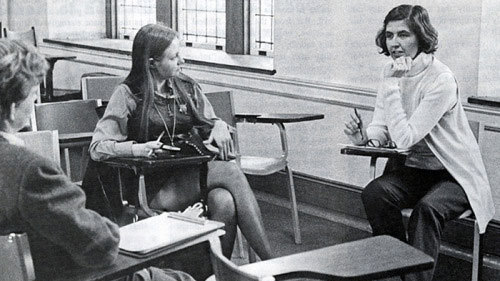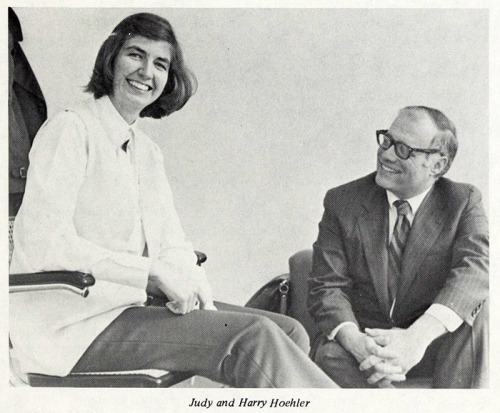
The Rev. Judith Hoehler, BD ’58
“I had not intended to go on into a ministry. I really had
intended to take a year out and go back into foreign service, but after I had
been there for about six months studying, I knew that this was the place where
I wanted to be. I felt my calling was in theology and ministry.”
Judy Hoehler is one the first seven women to enroll and
receive a BD degree, which would later become the MDiv degree. She is also
among the first denominational counselors at HDS, representing Unitarian
Universalism.
A Time of Rejuvenation
Judy’s path to HDS began in South America.
She explains, “I had been a Spanish major in college and had received a fellowship to do graduate work in Latin American studies at the University of Chile in Santiago. The more that I studied down there, the more I realized that the questions I was asking about how I wanted to spend the rest of my life were theological questions. And so, I decided to take a year off, since I was slated to go into foreign service, and go to divinity school, where I could address some of these issues.”
In the spring of 1955, a friend encouraged Judy to apply to Harvard Divinity School. It was opening its doors to women for the first time that fall, and what was more, Paul Tillich was coming to HDS.
“It was going through a rejuvenation,” Judy explains, “and I thought it would be a very exciting place to study. I lived in Massachusetts, and my brother had gone to Harvard, and so, when I got home, I went and applied and was accepted as one of the seven first women.”
We Were Pathbreakers
When she arrived, Harvard had no dormitory space for women.
Dean Douglas Horton and Mrs. Mildred McAfee Horton presented a solution. The
Harvard Press building was undergoing renovations to become Jewett House, a
home on Francis Avenue for the Dean, so the School had rented another house on
Francis Avenue from the ambassador to India, Professor Galbraith, for the new
dean and his wife.
Judy recalls, “It was a large house, and the Hortons very
graciously opened two of the rooms to two of the woman students, and that was
for Letty and for me.”
Shortly into the school year, Mrs. Horton held a tea for the
seven women students at her home. Mrs. Horton was the former president of
Wellesley and the founder the WAVES, the women’s navy during the second world
war, at President Franklin Roosevelt’s request.
“She had a tea for us because she thought we would benefit
from hearing her experiences in breaking into an all-male bastion. It was a
wonderful afternoon. All seven of us saw ourselves as breaking new ground.”
One example Judy recalls is the first day of classes, which was
also the first day that morning prayers in Memorial Church’s Appleton Chapel were
open to women.
“Up until that time, Radcliffe College students had been able to come to morning prayers, but they would have to sit in the main sanctuary of Memorial Hall and listen to the prayers through the choir screen. So Letty and I got up early. We were determined to be the first women to attend morning prayers, and we were the first women that day to get there. We later learned that George Buttrick, who was the university preacher that had come the spring before, had insisted that his wife be allowed to come to morning prayers, so in fact, she was the first woman. But Letty and I certainly saw ourselves as pathbreakers.”

Accepted Inside, Rejected Outside
When classes began, unlike Letty who had been a Bible major
at Wellesley, everything was new to Judy.
“Every course opened up my mind to whole worlds that I had
not been aware were there. I really was blessed with some superb lecturers,
such as Tillich. Another plus that should not go unmentioned was the fact there
were so many denominations, and eventually, world religions represented there.
That was something that really did enrich education at Harvard.”
Judy and Letty fell in with a group of graduate students
very early.
“They were all strongly in favor of women’s education at the
Divinity School. The faculty seemed very supportive. They seemed to not make a
distinction, faculty such as Conrad Wright, George Williams, James Luther
Adams, Paul Tillich, Richard Niebuhr, and Krister Stendhal. I felt very little
prejudice at that time. If there was any, I was not aware of it. But Letty was.
She spoke about it to me. Even after, I only noticed it in little subtle ways.
For example, if we were in some discussion around a table and I said something,
then later what I had said was brought up, it would be attributed to one of the
male students. Other than that, I did not feel it.”
Both Letty and Judy did denominational work and met with
much more prejudice in seeking ordination than either had at the School.
“In the 1950s there was a perception that the proper role
for women in the church was in religious education or pastoral work rather than
engaging in intellectual scholarship, theology, or official ordination.”
Even so, Judy applied for ordination in the American
Unitarian Association, a very liberal denomination that had ordained quite a
few women at the turn of the century. By the time Judy applied though, that had
changed. There were only one or two women ordained, older women whom Judy knew.
“In my interview, I was told that I had a fine record, and I
would do a good job, but unfortunately, since it was a congregationally run
denomination, the congregations probably were not yet ready for women in
leadership positions.”
Afterward, Judy compared interview notes with her classmate
William Jones, who applied at the same time.
“It was interesting because we were both told the same
thing, only his reason being that he was African American, and mine being a
woman. William went on to become a professor of theology, and, of course, I
went on to become a pastor, although it took a little while. It was not courage
so much as a real desire to do ministry that allowed me to move forward. It was
a passion to show churches that women could be pastors.”
Women Can Do the Work
There were two phases in the admission of women to Harvard
Divinity School. The first was granting women access to the institution. The
second was reckoning with the implications of women entering the conversation
in terms of texts, doctrines, practices, and church history.
Judy explains, “The second stage happened after we left
because the women’s movement was just getting underway when we were students
there. Our primary focus was on proving that women could do the work and women
could, in fact, become pastors and theologians. I think we did succeed because
Letty and I were the only two students to graduate with honors out of the 25 to
30 graduating students three years later in ‘58.”
Judy and Letty were also the only two of the first seven
women to complete the three-year BD/MDiv program.
“It was an exciting time, particularly the textual criticism
that was emerging called feminist works,” Judy recalls.
By the mid-1980s people like Clarissa Atkinson, Elisabeth
Schüssler Fiorenza, Phyllis Trible, and Letty Russell were all producing
work looking at scripture, religious history, and theology from a female
perspective.
“They were simply mining history from a different point of
view. By the time I returned to Harvard in 1985 as an instructor in preaching
and denominational counselor for Unitarian Universalism, more than half of the
students were women. That was quite a remarkable change.
“I think the School should look back on the involvement of
women, beginning in 1955, with pride, certainly. But with humble pride. It was
a good thing that they opened admission to women, but seven women, or nine if
you count two who were part time, in our entering class of over 120 was not a
very big thing. HDS was not the first of the professional schools to do this at
Harvard. However, once HDS decided to do it, they did it well.”
A 60-Year Co-Ministry
Attending HDS changed Judy’s life in many ways.
“I had not intended to go on into a ministry. I really had
intended to take a year out and go back into foreign service, but after I had
been there for about six months studying, I knew that this was the place where
I wanted to be. I felt my calling was in theology and ministry.”
One moment that helped shape Judy’s future life and ministry
was when she met Harry Hoehler, a Unitarian looking to enter the ministry.
Harry and Judy eventually married, and Judy became a Unitarian bent on ministry
as well.
“I was pregnant when I graduated, or very soon after. We had
three children relatively close together, and so, I decided to put off
ordination until the children were a little bit older. But I was doing a lot of
work. In the early ‘60s, the women’s movement was beginning to blossom, and I
was doing a lot of lecturing in churches. Around ’65, I was on the first
denominational committee that went around to Unitarian churches looking for new
ministers and give them a training session. It was required before they could
get names from the department of the ministry. It was about a day-long workshop
on being open to calling women as pastors because by then, we were getting a
number of very talented women into the Unitarian ministry as well as ministry
in general.”
Judy identifies her “solid grounding in intellectual,
academic theological and Biblical work” as one of the most important things she
took away from HDS.
“It made writing sermons more central to my ministry because
I began to see that the role of the pastor really is to interpret the
scriptures for the contemporary scene, how one’s faith was to be acted in the
present time. That’s certainly what governed all the lectures I did on women,
women in society, and women in the church.”
She recalls, “As students, Letty and I used to complain, as
did other classmates, about the fact that we really got your training by doing
student work in little churches around the state. Although there were pastoral
theology classes and so forth and the School was supposed to train you for the
ministry, we felt there was not much training for it.
“I have to say, though, that through my years in the
ministry, what has stood in good stead for me has been the very rigorous grounding
that the faculty required of us in our courses in theology, church history, New
Testament, Old Testament. That is something that stays with you. It whets your
appetite so you continue studying, and working, and joining groups like the
Boston Ministers Association, where you read papers to one another.
“I think that’s really my greatest gratitude to the Divinity
School. And the fact that the Divinity School was so open to the many branches
of Christendom and ultimately of world religions. It led Harry and me to both
be involved in interdenominational, interreligious work, through our whole
ministry. It’s been 60 years that Harry and I have been in co-ministry, and it
has been a very rich life, I must say.”
Edited by Natalie Campbell; original interview by Rich Higgins / Photos: Harvard Divinity Bulletin and Andover-Harvard Theological Library

 dragweevil liked this
dragweevil liked this  stoicbeast47 liked this
stoicbeast47 liked this  tantricmaverick reblogged this from humansofhds
tantricmaverick reblogged this from humansofhds